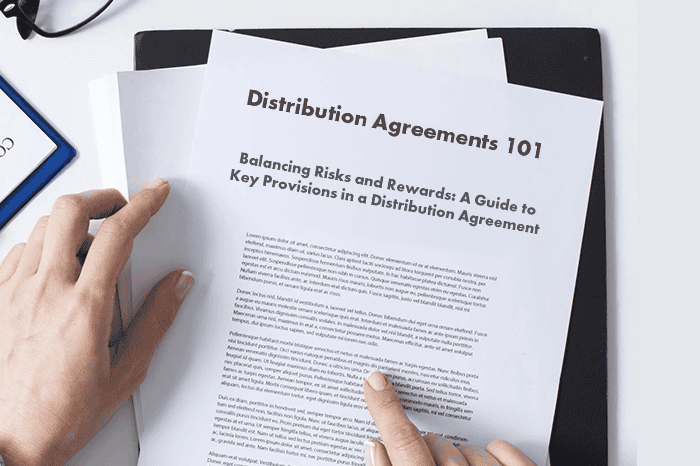Table of Contents
What is a Distribution Agreement?

A distribution agreement is a contract that facilitates exchange between a company that supplies products and a company that specializes in marketing and selling those products. The distributor company purchases these products with the agreement that they will sell these products to clients in a specified geographical area. In balancing risks & rewards in Distribution Agreements, a key aspect is determining exclusivity. Learn more about essential terms and strategies in our comprehensive guide.
A distribution agreement specifies the period for which the contract will be in effect, the terms and conditions of the agreement, the price of purchase and sale, the number of products to be sold, and the area of trade. The agreement also specifies whether exclusivity of trade will be applicable in the contract. This means that the supplier can either choose to make the distributor the sole distributor for sale or provide the relevant rights to other distributors. Generally, producers make a choice to maintain or avoid exclusivity based on their intentions and sales strategies. If they want to promote and foster competition, they are less likely to assign exclusivity to a single distributor. If the producer wants to maintain a strict standard of trade and avoid competition, they are more likely to include the exclusivity term in the distribution agreement.
Key Provisions of a Distribution Agreement
A distributor agreement is different to a developer distribution agreement and it employs language that makes the agreement legally binding to its parties. The distribution agreement includes identification clauses that recognize the parties in the contract. This includes the name, location and other relevant details of the producing and distributing company. The territory within which a producer can sell their products is also outlined in the distribution agreement.
The status of exclusivity is clarified in the distributor’s agreement. If the producer intends to promote competition to accelerate the sales of their product, they are less likely to provide exclusive rights to a single distributor. Likewise, the agreement also describes the relationship of the distributing company with the producing company. For instance, it outlines whether the distributing company is an independent contractor for the producers or they are employed by the suppliers.
The logistical aspect of the agreement is also recognized in the agreement. It includes details about the number of products to be supplied, the method of supply, its location, the price, and the method of payment. Additionally, distribution agreements also include a statement that obligates the suppliers to comply with the distributor’s orders. The agreement also addresses the circumstance where the distributor may fail to sell the supplier’s products. It presupposes and guides the parties for the probable scenarios.
Balance Risks and Rewards in a distribution agreement
Appointing a distributor to sell your products does not necessarily mean that you are immune to the risks associated with selling a product within the market uncertainty. The distributor you appoint may not comprehensively understand your product or its consumers. For suppliers that specialize in technology-based products, appointing a distributor who lacks the facility to provide the required repair services could mean that consumers may avoid purchasing your products. If the sales ambitions of your distributor do not match the production and supply capacity of your company, the relationship with your distributor may not sustain.
In seeking a company that specializes in distribution, it is crucial for you to appoint an organization that holds the capacity to cater to your targeted customers. This extends to the availability of resources. If your company is seeking to appoint distributors overseas, it is intrinsic to employ caution. You want to ensure that your distributor has the facilities required for the sale of your products. Ensure that they have the resources that suffice the requirements of transport, warehousing, marketing, and advertising. Understand the legislation, local custom, consumer trends, and trade laws of the nation prior to appointing the distributor. It is helpful to confirm that the distributor understands the market of their territory of sale.
You can maximize the rewards of the arrangement by making sure that the distribution agreement clarifies the terms and conditions of the agreement. Make sure that the agreement includes crucial details like payment and termination clauses so that each party stands by the agreed bargain.
Conclusion
If your company is planning to appoint a distributor to sell your products, you will require a distribution agreement to set the terms and conditions for the deal. The distribution agreement will outline the details regarding the parties involved in the contract, the status of exclusivity, the logistical information, payment terms, and the clause concerning the termination of the agreement. Each party will bear the responsibility to perform according to the contract as it is a binding document. A distribution agreement consists of balancing risks and rewards that the supplier should be aware of. If you want to balance the risks and maximize the rewards that you can secure through the agreement, it is you should be cautious in appointing your distributor and ensure that the distributor agreement clearly defines the role of each party while and should address scenarios where either party fails to perform.
You might also like:
- Distribution Agreement Template
- Manufacturing Agreement Template
- Purchase Order Template
- Software Reseller Agreement
Raveena Rani
Raveena is a seasoned International IP Counsel with a unique blend of engineering and legal acumen, specializing in Intellectual Property, Technology Law, and Corporate Transactions. She has extensive experience drafting and negotiating NDAs, commercial agreements, and legal documents in the areas of M&A, SaaS, and AI. Her global perspective is complemented by hands-on internships, corporate counsel roles, and mentoring initiatives. She thrives at the intersection of law, business, and technology.






